Life
Why Do Babies Have Yellow Skin? 3 Reasons Your Child’s Complexion May Be Off
Any time something seems off with your baby, it’s normal to be scared and panic, especially because a little one can’t tell you if anything hurts. So when you discover that your sweet rosy-cheeked babe has a yellowish tint to their skin, it’s understandable that you might be worried. But knowing why some babies have yellow skin can help curb any fears and ease your mind until you get your little one into their doctor.
Jaundice is probably the most likely reason why your baby, especially a young one, has yellow skin. According to the Mayo Clinic, jaundice is a yellow discoloration of your baby’s skin from an excess of bilirubin in your baby’s blood stream. Bilirubin is a yellow pigment of the red blood cells in the body and the extra amount is caused by a baby’s liver not being mature enough to rid the bloodstream of the pigment. It’s extremely common and is usually treated with phototherapy. It only takes a few weeks for it to go away in most babies, and the levels peak between three and seven days after birth. Once your week old baby is checked out by a pediatrician, any future complications from jaundice are probably already detected or nonexistent.
If your baby is older and has been cleared for jaundice, there could be a few other possibilities. If your kiddo has started eating, a yellowish tint to the skin could be caused by carotenemia. An extremely common condition, carotenemia is often mistaken for jaundice and causes a lot of concerns and fear. This condition is nothing like a disease and is literally caused by eating too many carrots or other yellow-tinted vegetables, especially those containing a lot of beta-carotene. It’s nothing to worry about, however, so if your baby is a carrot fiend, there’s no need to cut them off.
And in a more serious light, a baby’s yellow skin can be the cause of hepatitis B. This can be a very serious disease and cause liver damage or liver cancer. One of the symptoms includes yellowing of the skin. The Centers for Disease Control and Prevention recommends that a baby receive one dose of the hepatitis B vaccine at three different ages — birth, one to two months, and six months.
Regardless of why you think your baby’s skin has taken on a yellow hue, it’s always best to put in a call to your pediatrician and get them checked out. There’s nothing like an expert telling you that your kid just ate too much squash to relieve you of your fears!
